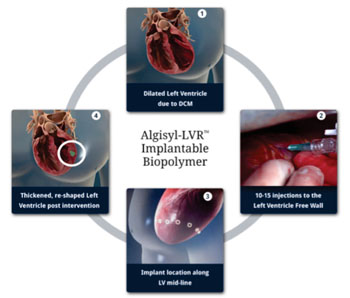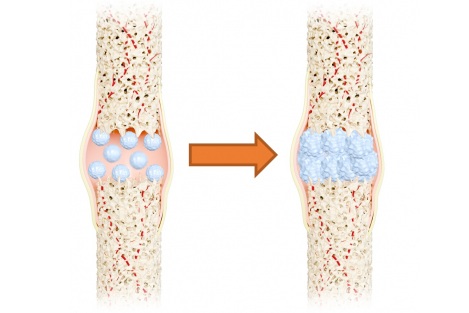Hydrogel Implant Helps Increase Cardiac Output 
|
By HospiMedica International staff writers Posted on 15 Oct 2014 |

Image: The Algisyl-LVR hydrogel implant procedure (Photo courtesy of LoneStar Heart).
An implantable hydrogel may revolutionize the treatment of heart failure (HF) in people with an enlarged left ventricle who lose the ability to pump blood efficiently.
The Algisyl-LVR implant is an injectable proprietary biopolymer intended to reverse HF progression by decreasing cardiac wall tension and improving heart muscle contractility and oxygen uptake, thus leading to a decrease in ventricle stress and to cardiomechanical improvement. Administered directly into strategic areas of the left ventricle muscle in 12–18 injections, the hydrogel thickens to form viscous bodies of polymer that remain in the muscle as permanent implants, reducing ventricular wall stress, increase pumping efficiency, and mitigating further dilation and negative remodeling of the left ventricle.
Two versions are being developed; a surgical product version intended for cardiothoracic surgeons, which is delivered in a standard syringe and custom needle system for performing the injections either during open chest surgery (in combination with other interventions such as bypass or valve repair), or through a stand-alone mini-thoracotomy operation. The second product delivery method offers a minimally invasive, catheter-based procedure that can be performed by interventional cardiologists or other specialists in a standard or hybrid cardiology laboratory.
The treatment does not interfere with drug therapies and the regular management of HF patients, since it consists of a one-time passive procedure. Once injected directly into the heart muscle, the hydrogel acts immediately as an internal scaffold that does not undergo long-term degradation. A randomized clinical trial (the AUGMENT-HF study) is underway in 14 centers worldwide to determine superiority to standard medical therapy. The Algisyl-LVR Hydrogel Implant is a product of LoneStar Heart (Laguna Hills, CA, USA), and has received the European Community CE marking of approval.
“Patients may soon have a revolutionary treatment to reduce the symptoms of moderate to severe heart failure and provide improvement in their clinical status and quality of life,” said Frank Ahmann, president and CEO of LoneStar Heart. “Our safety and efficacy results are consistently trending in the right direction, and we are looking forward to presenting the results of our AUGMENT-HF randomized clinical trial of Algisyl-LVR at the upcoming AHA meeting.”
Advanced HF represents a significant and growing epidemic healthcare burden in all developed countries, affecting patients whose heart muscle is initially damaged by infarcts, hypertension, valve disease, or other processes. To overcome the initial damage, the heart muscle works under increased stress without an opportunity to recover; eventually, the muscle of the left ventricle begins to stretch and the muscle cells lose the ability to contract normally. The therapeutic options for many of these patients who do not respond to drug and device therapies are limited and can be extremely complex and costly.
Related Links:
LoneStar Heart
The Algisyl-LVR implant is an injectable proprietary biopolymer intended to reverse HF progression by decreasing cardiac wall tension and improving heart muscle contractility and oxygen uptake, thus leading to a decrease in ventricle stress and to cardiomechanical improvement. Administered directly into strategic areas of the left ventricle muscle in 12–18 injections, the hydrogel thickens to form viscous bodies of polymer that remain in the muscle as permanent implants, reducing ventricular wall stress, increase pumping efficiency, and mitigating further dilation and negative remodeling of the left ventricle.
Two versions are being developed; a surgical product version intended for cardiothoracic surgeons, which is delivered in a standard syringe and custom needle system for performing the injections either during open chest surgery (in combination with other interventions such as bypass or valve repair), or through a stand-alone mini-thoracotomy operation. The second product delivery method offers a minimally invasive, catheter-based procedure that can be performed by interventional cardiologists or other specialists in a standard or hybrid cardiology laboratory.
The treatment does not interfere with drug therapies and the regular management of HF patients, since it consists of a one-time passive procedure. Once injected directly into the heart muscle, the hydrogel acts immediately as an internal scaffold that does not undergo long-term degradation. A randomized clinical trial (the AUGMENT-HF study) is underway in 14 centers worldwide to determine superiority to standard medical therapy. The Algisyl-LVR Hydrogel Implant is a product of LoneStar Heart (Laguna Hills, CA, USA), and has received the European Community CE marking of approval.
“Patients may soon have a revolutionary treatment to reduce the symptoms of moderate to severe heart failure and provide improvement in their clinical status and quality of life,” said Frank Ahmann, president and CEO of LoneStar Heart. “Our safety and efficacy results are consistently trending in the right direction, and we are looking forward to presenting the results of our AUGMENT-HF randomized clinical trial of Algisyl-LVR at the upcoming AHA meeting.”
Advanced HF represents a significant and growing epidemic healthcare burden in all developed countries, affecting patients whose heart muscle is initially damaged by infarcts, hypertension, valve disease, or other processes. To overcome the initial damage, the heart muscle works under increased stress without an opportunity to recover; eventually, the muscle of the left ventricle begins to stretch and the muscle cells lose the ability to contract normally. The therapeutic options for many of these patients who do not respond to drug and device therapies are limited and can be extremely complex and costly.
Related Links:
LoneStar Heart
Latest Critical Care News
- Origami Robots to Deliver Medicine Less Invasively and More Effectively
- Improved Cough-Detection Technology Aids Health Monitoring
- AI Identifies Children in ER Likely to Develop Sepsis Within 48 Hours
- New Radiofrequency Therapy Slows Glioblastoma Growth
- Battery-Free Wireless Multi-Sensing Platform Revolutionizes Pressure Injury Detection
- Multimodal AI to Revolutionize Cardiovascular Disease Diagnosis and Treatment
- AI System Reveals Hidden Diagnostic Patterns in Electronic Health Records
- Highly Sensitive On-Skin Sensing Monitor Detects Vitamin B6 and Glucose in Sweat
- Artificial Intelligence Revolutionizing Pediatric Anesthesia Management
- New Device Detects Tuberculosis DNA Directly in Exhaled Air
- New Menstrual Cup Could Detect Infections and Improve Diagnostics
- Engineered “Natural Killer” Cells Could Help Fight Cancer
- Faster Lymph Flow Predicts Better Response to Diuretics in Acute Heart Failure
- New Global Recommendations Aim to End Deaths from Postpartum Hemorrhage
- 'Flat-Line ECG' Indicates Poor Outcomes for Out-Of-Hospital Cardiac Arrest
- New Guidance to Improve Diagnosis and Management of Heart Failure During Pregnancy and Postpartum
Channels
Surgical Techniques
view channel
Novel Glue Prevents Complications After Breast Cancer Surgery
Seroma and prolonged lymphorrhea are among the most common complications following axillary lymphadenectomy in breast cancer patients. These postoperative issues can delay recovery and postpone the start... Read more
Breakthrough Brain Implant Enables Safer and More Precise Drug Delivery
Delivering medication directly to specific regions of the brain has long been a major challenge in treating neurological disorders. Current implants and infusion systems typically reach only one or two... Read morePatient Care
view channel
Revolutionary Automatic IV-Line Flushing Device to Enhance Infusion Care
More than 80% of in-hospital patients receive intravenous (IV) therapy. Every dose of IV medicine delivered in a small volume (<250 mL) infusion bag should be followed by subsequent flushing to ensure... Read more
VR Training Tool Combats Contamination of Portable Medical Equipment
Healthcare-associated infections (HAIs) impact one in every 31 patients, cause nearly 100,000 deaths each year, and cost USD 28.4 billion in direct medical expenses. Notably, up to 75% of these infections... Read more
Portable Biosensor Platform to Reduce Hospital-Acquired Infections
Approximately 4 million patients in the European Union acquire healthcare-associated infections (HAIs) or nosocomial infections each year, with around 37,000 deaths directly resulting from these infections,... Read moreFirst-Of-Its-Kind Portable Germicidal Light Technology Disinfects High-Touch Clinical Surfaces in Seconds
Reducing healthcare-acquired infections (HAIs) remains a pressing issue within global healthcare systems. In the United States alone, 1.7 million patients contract HAIs annually, leading to approximately... Read moreHealth IT
view channel
Printable Molecule-Selective Nanoparticles Enable Mass Production of Wearable Biosensors
The future of medicine is likely to focus on the personalization of healthcare—understanding exactly what an individual requires and delivering the appropriate combination of nutrients, metabolites, and... Read moreBusiness
view channel
Philips and Masimo Partner to Advance Patient Monitoring Measurement Technologies
Royal Philips (Amsterdam, Netherlands) and Masimo (Irvine, California, USA) have renewed their multi-year strategic collaboration, combining Philips’ expertise in patient monitoring with Masimo’s noninvasive... Read more
B. Braun Acquires Digital Microsurgery Company True Digital Surgery
The high-end microsurgery market in neurosurgery, spine, and ENT is undergoing a significant transformation. Traditional analog microscopes are giving way to digital exoscopes, which provide improved visualization,... Read more
CMEF 2025 to Promote Holistic and High-Quality Development of Medical and Health Industry
The 92nd China International Medical Equipment Fair (CMEF 2025) Autumn Exhibition is scheduled to be held from September 26 to 29 at the China Import and Export Fair Complex (Canton Fair Complex) in Guangzhou.... Read more














